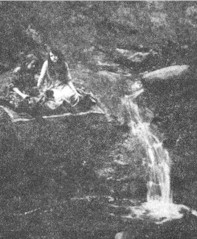

![]()
![]()
![]()
![]()
![]()
![]()
![]()
![]()
![]()
|
When Elsie Wright and Frances Griffiths |
|
"Fooled the World" |
| During the summer of 1917 Elsie Wright (16) and her cousin Frances Griffiths (10) |
| were playing at the Cottingley Beck (a small stream) and Elsie fell into the water. Out of |
| fear of getting into trouble, the girls fabricated a story about playing with fairies. This story |
| fooled the world for the next 68 years. They cut out pictures of fairies and photographed |
| themselves and the fairies with Elsie's father's camera. At first, Mr. Wright believed the |
| pictures to be fake. He knew his daughter was a talented artist and drew pictures of |
| fairies. Copies of the pictures had been given to friends and family. |
| In 1919, girl's mothers, Polly Wright and Annie Griffiths attended a meeting about |
| Theosophy. Theosophy was philosophy that included the possibility of nature spirits in |
| teachings. The women spoke to the speaker about the photos. Edward Gardner, a leader |
| in the Theosophical movement, contacted Polly Wright telling her that the photographs |
| were "the best of its kind I should think anywhere." The Wright's forwarded the original |
| negative plates to Mr. Gardner who sent them to a photographic expert by the name of |
| Harold Snelling. "What Snelling doesn't know about faked photography isn't worth |
| knowing," was a common statement made about Snelling. |
| Snelling concluded, "This plate is a single exposure. These dancing figures are not |
| made of paper nor any fabric; they are not painted on a photographic background-but |
| what gets me most is that all these figures have moved during the exposure." Meaning |
| that the camera's shutter speed was set low causing the figures to be blurred as if the |
| exposure had caught them moving in their dance. |
| Sir Arthur Conan Doyle, the creator of Sherlock Holmes and a member of the |
| Spiritualists movement, was contacted. Edward Gardner reported to Conan Doyle that |
| he believed that Elsie Wright and Frances Griffiths was telling the truth. Conan Doyle |
| included the photographs in an article he wrote for The Strand magazine and suggested |
| that more photographs be taken while the girls were being observed by a "disinterested |
| witness." |
| Much criticism was received from the article. Major Edward Halls, a radium |
| expert wrote: |
| "On the evidence I have no hesitation in saying that these |
| photographs could have been faked. I criticize the attitude |
| of those who declare there is something supernatural in the |
| circumstances attending to the taking of these pictures because, |
| as a medical man, I believe that the inculcation of such absurd |
| ideas into the minds of children will result in later life in |
| manifestations and nervous disorder and mental disturbances..." |
| In 1920 Edward Gardner persuaded Elsie Wright and Frances Griffiths to take |
| more photographs of the fairies. After several weeks, the girls produced additional |
| photographs now totaling five. |
| In 1921, Geoffrey Hodson, a well-known clairvoyant, went to Cottingley to |
| search for spirits. He claimed that he, like the girls, could see the fairies. |
| For many years the world has been fascinated with the Cottingley Fairies, fact or |
| fiction. Peter Chambers, The Daily Express, interviewed Elsie in 1966. She told him that |
| the fairies might have been "figments of my imagination." but it was unclear if she meant |
| that she had indeed faked the photographs or believed she had photographed her |
| thoughts. |
|
For the next five years, Elsie and Frances
were interrogated. The BBC-TV program Nationwide, interviewed Elsie. She
seemed very evasive on whether she had actually photographed real fairies
and the BBC crew came to the conclusion that the pictures had been paper
cutouts made to stand up with hat pins. Joe Cooper interviewed Elsie and Frances in 1981 and 1982 for an article titled "The Unexplained". Elsie admitted that all five of the photographs had been faked. Frances claimed that the first four had been faked, but the fifth photograph was real. |
 |
|
Elsie and Frances at the Beck |
All Pages Created by Jacqueline Bachellor, Rose Mutchler, & Daniel Sloan